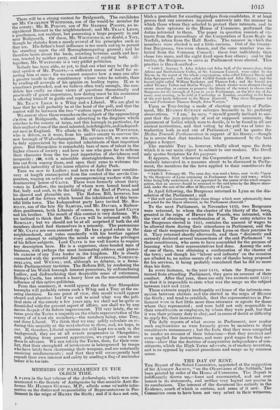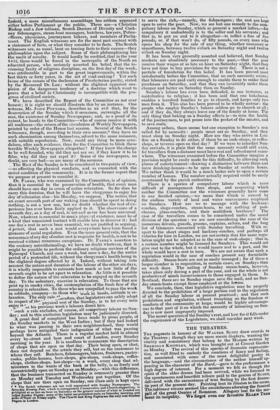THE DAY OF REST.
THE Report of the Select Committee, appointed at the suggestion of Sir ANDREW AGNEW, "on the Observance of the Sabbath," has been printed by order of the House of Commons. The Report is indifferently drawn up,—loose and unconnected, and not over honest in its statements, and neither very logical nor precise in its conclusions. The interest of the document lies entirely in the Evidence, much of which is curious, and some of it new. The Committee seem to have been not very select in their witnesses. Indeed, more miscellaneous assemblage has seldom appeared either before Parliament er the public. There are—a Christian 'Bishop and a Jew tollman, Scotch Doctors of Divinity and Cock- ney fishmongers, steam-boat managers, butchers, lawyers. Police- officers, physicians, journeymen bakers, and members of Parlia- ment. The English witnesses are for the most part content with a statement of facts, or what they consider to be facts. The Scotch svitnesses are, as usual; bent on truing facts to their causes—they philosophize upon the subject. Some of their philosophizing has the merit Of novelty. It would hardly be credited, that in the year Ian, there would be found in the metropolis of the North an educated person, who seriously asserted his belief, that the in- creasing laxity of religious discipline, on the first day of the week, was attributable in part to the great improVements, within the last thirty or forty years, in the art of road-making! Yet such is one of the causes of the declension of Presbyterian purity, stated 13y the Reverend Dr. LEE; without the slightest apparent sus- picion of the dangerous tendency of a doctrine which went to prove that a belief in Christianity is incompatible with the pro- gress of civilized society.
We have described the Report of the Committee as not over honest; it is right we should illustrate this by an instance. One witness, Mr. JOHN POYNDER, describes as an evil that, for the desecration of the Sunday which it occasions, outweighs all the rest, the existence of Sunday Newspapers; and, as a proof of its extent, he hands to the Committee—who of course receive it with all readiness—the return of the circulation of Weekly Newspapers, printed by order of the House last session. Several of the Scotch witnesses, though, according to their own account,* they have no Such abomination among themselves, advert to the same nuisance, with suitable reprobation. Now, could any thing be more scan- dalous, after Such 'evidence, than for the Committee to blink these terrible Weekly Newspapers altogether? If they knew the charge to be well founded, why did they not say so; if they knew it to be false, why did they not repel it? Some of the newspapers, no doubt, are very bad—so are many of the sermons.
The Rest of the Sunday is to be considered in two points of view, -7—ea affecting the physical comforts, and as connected with the moral condition of the community. It is in the former aspect that ,e purpose at present to consider it. . Dr. FARRE, who was examined by the Committee, is of opinion, that it is essential to the preservation of health, that every man should have one day in seven of entire relaxation. So far does he carry this doctrine, that he will have the clergyman to enjoy his day of relaxation also—his Monday, we suppose. The notion that an exact seventh part of our waking time should be spent in doing nothing, is not a new one, but we doubt whether the test of ex- perience has ever been fairly applied to it. The observance of a seventh day, as a day of rest, is not and never has been universal. Now, whatever is essential to man's phy-s:eal existence, must be of a kind that unassisted instinct will enable him to discover it: had one day's rest in seven been essential, we are justified in arguing, 4 priori, that such a rest would everywhere have been found a 7.neasure of social regulation. Even the more general rule, that the recurrence of any day ofentire rest is requisite for health, is not to be received ‘vithotit numerous exceptions. Dr. FARRE'S assertion to the contrary notwithstanding, we have no doubt whatever, that it might be possible to perform the ordinary religious services of the Episcopal Church, not once a week, but once a day, for the entire period of a protracted life, without the clergyman's health being in the slightest degree affected by it. Indeed, without taking into . account the nature and duration of the labour of the other six days, it is wholly impossible to estimate how. much or how little of the seventh ought to be set apart to relaxation. As little is it possible to define the nature of the relaxation to be enjoyed on the seventh day. To the sedentary, exercise is relaxation. To those that are pent up in smoky cities, the contemplation of the fresh face of the country is relaxation. To those who are compelled to pass the week in solitude, company—to those wh re- laxation. The only rule 'w7ork in bands, solitude is re- r., derefore, that legislators can safely adopt in respect oftl *physical rest of the Sunday, is to let every man enjoy it"---ds his Previous week's labours direct him. ' ouch a rule excludes, of course, all coMpulsory labour on Sun- day • and to this eXclusion legislation may be judiciously directed. great deal of complaint has been made by pious people, of the Sunday markets, in the West Indies ; but if they had looked to what was passing in their own neighbourhood, they would perhaps have mitigated their indignation of what was passing beyond the Atlantic. There is a regular market held in almost every by-street and lane and court of London, every Sunday morning in the year. It is needless to enumerate the description of shops that are open on that day. Their being open, or shut, does not depend on the article they sell, but on the customers to Whom they sell. Butchers, fishmongers, bakers, fruiterers, pastry- cooks, public-houses, beer-shops, gin-shops, cook-shops, ceffee- shops, clothes-shops, hat-shops—in a word, every shop that ad- ministers to. the. wants of the back or the belly, is as freely'and unrestrictedly open on Sunday as on Monday,—with this difference, that the business transacted on Sunday is commonly greater than on Monday and Tuesday and Wednesday- put together. Of the Shojis 'that 'are thus open on Sunday, one class only is kept open e • The Scotch witnesses -are *not well acquainted With Sunday Newspapers. The &thirdly Erriiisg Post, which is outrageously Conservative and Church-supporting. is London and 1Subliihed at as late an hour on Saturday as the greater nee4ntYLardlys:iigto.r- qttr.,
r azpu
agelrecnc;aftwuird? P early ononly reel Sunday
Papers in London.
to serve the nein—namely, the fishmongers; the rest are kept open to serve the poor. Now, we see but one remedy to the corn- pulsory labour on Sunday, which so general a market infersf ,— or compulsory it undoubtedly is to the seller and his servants; and that is, to put an end to it altogether—to inflict a fine of five pounds, or, if that won't do, of fifty pounds, on every man who opens his shop for the sale of any thing, whether necessary or superfluous, between twelve o'clock on Saturday night and twelve o'clock on Sunday night. It has been very generally asserted and believed, that Sunday markets are absolutely necessary to the poor,—that the poor receive their wages at so late an hour on Saturday night, that they have not time to buy provisions for the next day. There is not a particle of foundation for this belief. It has been proved most satisfactorily before the Committee, that no such necessity exists; that labourers are paid early enough to enable them to make their purchases on Saturday, and that they can invariably make them cheaper and better on Saturday than on Supday. Sunday's labour has even been defended, in one instance, as contributive to religion : it has been said that one bakehouse enables a hundred families to go to church, and. keeps only two men from it. This also has been proved to be wholly untrue: the people who employ Sunday's bakers seldom go to church at all ; and if they do, they always leave one of the family at home. The only thing that baking on a Sunday effects is—to ruin the health of the journeymen, to put pence into the pocket of the master, and. to save coals.
Among sellers, there seems but one exception to Sunday's rest called for by necessity : people must eat on Sunday, and they must sleep on Sunday night. How are they who arrive in Lon- don on a Sunday to do either, if there be no cook-shops, or coffee- shops, or taverns open on that day? If we were to interdict Sun- day arrivals, it is plain that the same necessity would still exist, for travellers from a distance must have rest and refreshment some- where. The witnesses examined before the Committee imagine a provision might be easily made for this difficulty, by allowing such places of entertainment—drawing a distinction between them and mere drinking-houses—to be open on Sunday at certain hours. We rather think it would be a much better rule to open a certain number of houses. The number actually required could be easily ascertained by the parish authorities.
There is a species of compulsory labour which is more difficult of management than shops, and respecting which neither the Committee nor the witnesses generally have come to any decided opinion,—we mean that which is caused by the endless variety of land and water conveyances employed on Sundays. How are we to manage with the hackney- coaches, stage-coaches, steam-boats, to say nothing of post- chaises, glass-coaches, and their multiform brethren? The case of the travellers comes to be considered under the moral division of the question : we are now considering the case of the numerous drivers, guards, grooms, captains, sailors, and the long list of labourers connected with Sunday travelling. "With re- spect to the short stages and hackney-coaches, and perhaps all vehicles for hire in London, we are not certain that the same regu- lation might not be adopted as in the case of cook-shops ; that is, a certain number might be licensed for Sundays. This would not give rest to the whole, but it would insure rest to a part, and the whole would have a rest in turn. We are not aware that such a regulation would in the case of coaches present any formidable difficulty. Steam-boats are not so easily managed ; for of these a larger number is in requisition, in certain cases, on Sundays than on week days. The sailing of Sunday steam-boats, however, takes place only during a part of the year, and on the whole is not productive of much inconvenience to those engaged in them. In Scotland, there are no Sunday stages save the mail, and no Sun- day steam-boats except those employed at the ferries. We conclude, then, that legislative regulation may be properly directed to the prohibition of a large portion and to the regulation of all the Sunday labour at present practised ; and that such prohibition and regulation, without trenching on the freedom or comforts of the community at large, would be highly. advantage- ous to that part of it on which the necessity of labouring on Sun- day is now most improperly imposed. The moral question of the Sunday's rest, and bow far it falls under the cognizance of the Legislature, we shall consider next week.



























 Previous page
Previous page